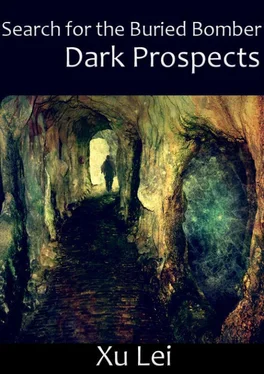Knowing yet another person had died disturbed me, especially because this soldier was so young. I have always believed that making mere kids risk their lives like this—all before they have truly begun to enjoy life’s pleasures—is just too unfair. Wang Sichuan was far from overly sentimental. He and other Mongolians possess a rather philosophical view regarding the passage of life. Though he would always claim to be a materialist, I firmly believe that inside he remained a purebred Mongolian, believing that to die is to be summoned by Tengri to return to the gray wolves, the white deer, and the grasslands. There is certainly nothing wrong with this kind of detachment, but I always used to say that the more detached a person is from death, the more cold-blooded he becomes. Your Genghis Khan was no softie, I would tell him. Perhaps in his heart he believed he was merely sending his foes back to heaven. Wang Sichuan refuted me at once. Qin Shihuang, the first Chinese emperor, showed no detachment when thinking about his own death, he said. That a person so scared of dying could nonetheless kill people like flies makes your argument just silly. Even the tiniest bit of detachment would be better than that.
A solid layer of blood covered almost half the body. This seemed unusual to Wang Sichuan, so we undid the corpse’s stiff clothing. There were two bloody holes in his back, each as thick as a thumb. The skin around them was all flared up. As military men, we were all too familiar with injuries like these—they were bullet wounds.
Even Wang Sichuan’s dark skin turned white. This made no sense. Had it been some sort of accidental death, we could have accepted it. Exploring an environment as complex and dangerous as this would make accidental deaths difficult to avoid, especially for wet-behind-the-ears new recruits. Murder changed the matter completely. Bullet holes meant someone had fired a gun, and that they had had a reason for doing so. Who would take a gun and murder his own comrade? Had the Japanese done this? It didn’t seem too likely, but they’d been gone only twenty years. Supposing that the trainee-level reinforcements were stationed here in their teens, by the time we arrived they’d only be in their thirties. Still, this place hardly seemed habitable, and we had yet to see a single sign of life. In which case, could there really be an enemy spy among us?
My mind spun. Wang Sichuan abruptly began to stuff the corpse back in among the steel bars.
“What are you doing?” I asked him.
He said that by murdering someone the spy had revealed his existence. So he’d hidden the body beneath the tarp, hoping to keep anyone else from discovering it. We’d surely be next on his list if he found out we were on to him. Against his gun we were dead meat. We had no choice but to cover the body back up.
“This way,” said Wang Sichuan, “he’ll have no idea that we know what’s going on and we can grab him when he’s not paying attention.”
After struggling for a bit, we managed to return the body to its original position. “We have to be much more careful now,” said Wang Sichuan.
I nodded. My mind was in a flurry. I’m used to high-tension situations, but the sensation I had was very different from the nervousness I might feel when confronting some natural obstacle. The two of us sighed, turned around, and prepared to continue on. At once I was aware that something wasn’t right. I shined my flashlight before me. Yelling out in fright, I stumbled backward to the floor. There was a man stretched out on the ground, his ghastly face craning up toward us. He stared at us with fixed eyes.
Yuan Xile had already given me this very sort of scare, but that didn’t mean I was immune to it. This man had crawled up, practically right behind our backs, without making the slightest noise. Now he was flat on the ground, staring wide-eyed like some strange beast. Wang Sichuan and I both leaped in fright. I fell to the floor, my lower back knocking against the steel bars. The pain was so great it nearly knocked the wind out of me. Regaining myself, I hurriedly swept my flashlight before me. The moment I spotted him, he dodged out of the beam. Suddenly he was up on all fours. With lightning speed he scrambled into the dark recesses of the factory, his movements no different from an animal’s.
“Grab him!” I yelled. By the time I stood up it would already be too late.
But Wang Sichuan had his own methods. “Shine the light on him!” he said. I swung the flashlight beam after the fleeing man. Wang Sichuan weighed the tube of his flashlight in his hand, then launched it at him.
I watched as the flashlight cut a magnificent arc, then smashed viciously down on the man’s knee just as he was about to disappear into the darkness. He let out a muffled groan and toppled over. He tried to get up, but the moment he righted himself he fell back down. This was the first time I’d actually seen Wang Sichuan’s skill with the bulu . While muddling along near the Chinese-Mongolian border, I’d heard miraculous descriptions of Mongolians throwing the bulu , but I never would have expected that, when truly used “on the hunt,” the movement could actually be so beautiful. Wang Sichuan later told me this throwing style was known as the j irugen bulu . Had he wanted to throw hard, no way would I have been able to make out the flashlight’s trajectory. I would have heard only the sound of it smashing down, but the man’s knee would have shattered. Truly the best-looking bulu style, he said, was that used for knocking birds out of the sky. One of his anda (his sworn brothers) was a real ace, far more formidable than he.
By the time we ran over, the man was back on all fours. Limping, he thrust himself through a sheet of tarpaulin concealing some back area. Inside, tarp-covered piles of supplies extended in endless rows. In an instant, he was gone. Wang Sichuan and I continued after him. Many of the tarps were covered in taut rope netting secured to the floor on either end, making it easy to trip. Wang Sichuan charged forward, tearing apart the piles. Beneath the tarps were canned goods and devices like corrugated sheets—seemingly a kind of filtration net—as well as a number of fuel tanks. The supplies were stacked in shallow, German-made frames, draped with a tarp and then tightly bound with a length of hemp rope or iron wire. These were packages for airdrops.
We were soon deep inside the dark warehouse. Nothing but close rows of supplies as far as the eye could see, the area vast and filled with shifting shadows, no different from a maze. This is bad, I thought. Wang Sichuan suddenly motioned for silence. His flashlight was on a tarp to our left, a section of which bulged and quivered. We tiptoed over and I leaned in close. Taking a deep breath, Wang Sichuan pulled off the tarp. A plume of dust was blown into the air. Out leaped a white shape, knocking me to the ground. There was so much dust my eyes wouldn’t open. I coughed violently, unable to see a thing. I heard Wang Sichuan curse once and then give chase.
I swore to myself and waved away the dust. The two of them were gone. “Wang Sichuan!” I yelled. I was about to go after them when I saw something that stopped me in my tracks. At first I wasn’t sure what it was, but after I brushed off the dust and pulled the tarp away, my eyes went wide. Underneath was a military sand table, complete with a crushed wooden model of the dam and a miniature Shinzan surrounded by cranes, mounts, and a number of tiny devices. It was all there.
I’m not sure if the readers have ever heard of a sand table before. Sand tables are small-scale models of terrain made using sediment, toy soldiers, and other materials. This one was probably used to simulate the final phase of the plane’s assembly on the underground river. Putting together a bomber as large as this in an underground void would naturally be much more complex than building one in a factory. This sand table was the consummate combination of the meticulous and the crude. The topographical base was slapped together with dowels and other pieces of wood seemingly carved on a whim, acceptable as long as they had the general shape. The pieces that decorated this rough landscape, though, were truly astonishing. I don’t remember all the structures, but what made the deepest impression on me was that already-broken dam, and the Shinzan behind it.
Читать дальше












